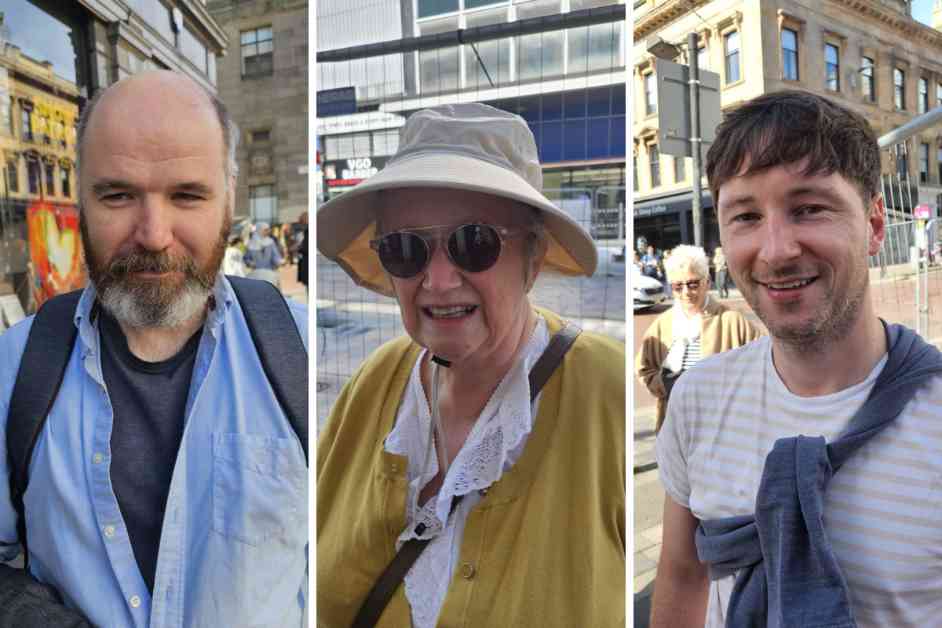The city of Glasgow is facing a divisive decision over whether it should bid to host the Commonwealth Games in 2026. Scotland’s Health Secretary, Neil Gray, has stated that recent talks have made it “more likely” that the games will return to Glasgow, potentially as a smaller event. However, Gray emphasized the importance of not using public money to fund the games, highlighting concerns about the financial implications of hosting such a large-scale event.
Glasgow last hosted the Commonwealth Games in 2014, and the prospect of bringing the iconic sporting event back to the city has sparked mixed reactions among residents. While some view it as an opportunity to attract attention, money, and visitors to Glasgow, others are apprehensive about the city’s readiness to take on the event and the potential costs involved.
Public Opinion on Hosting the Commonwealth Games in Glasgow
Hector McGillivray, a 59-year-old resident, expressed his support for Glasgow hosting the Commonwealth Games, citing the benefits of increased attention, revenue, and tourism for the city. Similarly, Jeanette McGuire, aged 67, welcomed the idea of the games, believing that it could bring economic opportunities and visitors to Glasgow.
On the other hand, Mark Brady raised concerns about the financial implications of hosting the Commonwealth Games, questioning whether the city has the necessary resources to support such a large-scale event. He emphasized the need to prioritize other pressing issues over investing in the games, citing examples of countries that faced financial difficulties after hosting similar events.
Daniel McCrorie, a 34-year-old resident, viewed the potential hosting of the Commonwealth Games as a positive opportunity to boost tourism and showcase Glasgow on a global stage. He expressed his support for the event, highlighting the benefits it could bring to the city.
Irene McFarlane, aged 72, shared her enthusiasm for the Commonwealth Games returning to Glasgow, citing her daughter’s previous volunteering experience during the 2014 games. She hoped that the event would incentivize infrastructure improvements in the city and create opportunities for community involvement.
Joe O’Neill, a 22-year-old resident, saw the potential hosting of the Commonwealth Games as a chance to attract visitors to Glasgow and address social issues like poverty. He believed that the event could serve as a platform for raising awareness and initiating discussions on important city-wide challenges.
Robyn Carter, 21, echoed the sentiment that hosting the Commonwealth Games could bring positive attention to Glasgow and improve its reputation. She acknowledged the concerns raised by others but believed that the overall impact of the event would be beneficial for the city.
Emma Murray, 23, expressed reservations about the potential hosting of the Commonwealth Games, citing previous instances where infrastructure investments were neglected after similar events. She stressed the importance of addressing existing social and economic issues in Glasgow before committing to hosting the games, emphasizing the need for thoughtful planning and prioritization.
Ramsay McMahon, a supporter of bringing back the Commonwealth Games to Glasgow, recalled the positive atmosphere and community benefits generated by the event in 2014. He highlighted the housing opportunities created as a result of the games, emphasizing the potential for long-term benefits for the city.
Overall, the debate over whether Glasgow should bid to host the Commonwealth Games in 2026 reflects a range of perspectives among residents. While some view the event as a valuable opportunity to showcase the city and boost its economy, others raise valid concerns about the financial costs and long-term implications of hosting such a large-scale event. As the city continues to weigh the pros and cons of pursuing the bid, it remains essential to consider the diverse opinions and priorities of its residents in making a well-informed decision.














